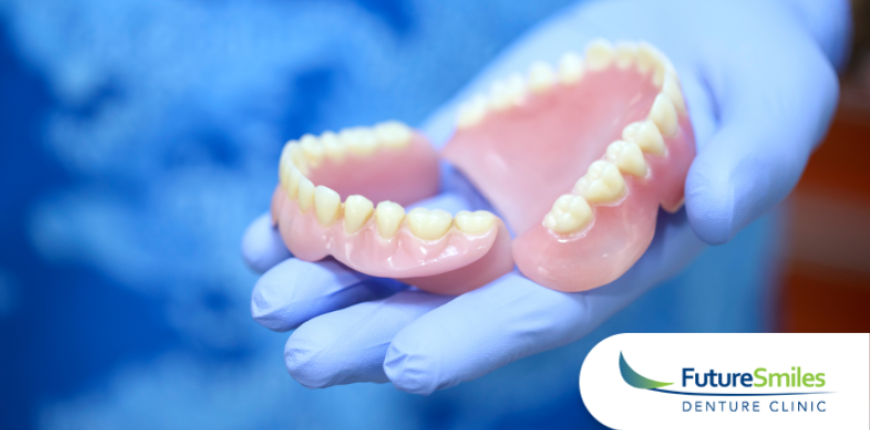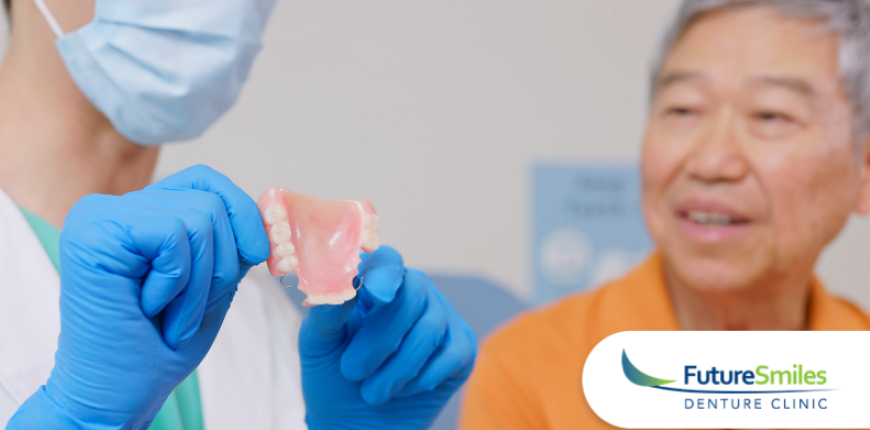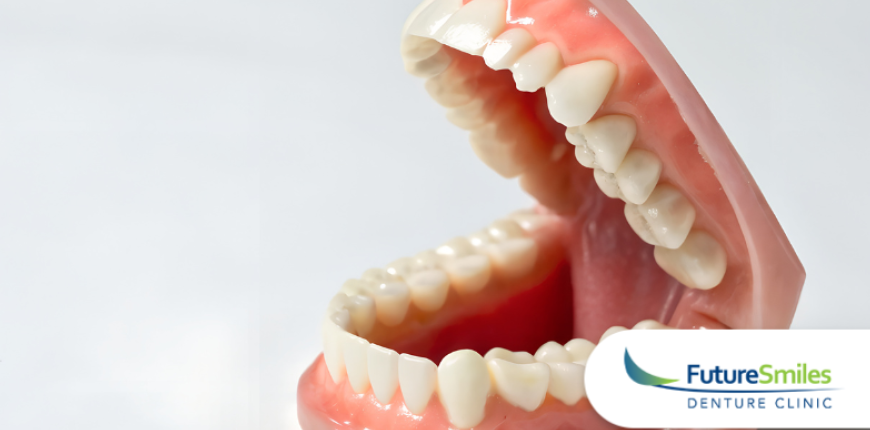Proper oral care is of paramount importance when you have tooth implants or dentures. Here are some simple tips on how to brush and floss when you have replacement teeth to keep your smile bright and healthy.
Whether you have all your natural teeth or have recently got tooth implants or traditional dentures, brushing and flossing are very important to your oral hygiene, along with yearly visits to your denturist for dental cleanings and regular checkups.
Proper brushing and flossing can enhance the health of your mouth and are important for preventing:
- tooth decay
- periodontal disease
- halitosis (bad breath)
- teeth staining
Customised Tooth Implants at our Calgary Denture Clinic
At Future Smiles, we offer a wide range of quality and affordable tooth replacement options from tooth implants and flexible partials to traditional full dentures, to meet all your unique oral needs and restore the health and function to your smile.
How to Brush & Floss When You Have Tooth Implants or Dentures
Taking care of your dentures or tooth implants, and following a strict dental hygiene routine is absolutely critical for protecting the health of your mouth and to ensure the longevity of your replacement teeth.
Here are some simple and easy tips on how to brush and floss correctly so your smile can always be bright and healthy:
The Proper Way to Brush
You should brush your teeth at least twice a day; ideally in the morning and especially at night, just before you go to bed. For denture wearers, the perfect toothbrush is small in size, with soft, rounded-end bristles, and is no more than three months old.
What about electric toothbrushes? The Canadian Dental Association has stated that electric toothbrushes, especially those with rotating or oscillating heads, are more effective than other toothbrushes.
Basic Guide to Brushing Your Tooth Implants:
- Place your toothbrush at a 45-degree angle where your teeth and gums meet.
- In slow and small circular motions, gently brush your gum-line, teeth, and tooth implants.
- DO NOT scrub or apply too much pressure to your teeth as this may cause damage to the gums and tooth enamel.
- Make sure to brush every surface of every tooth, cheek-side, tongue-side, and chewing surfaces. Often forgotten, it’s important to place special emphasis on the surfaces of your back teeth.
- Brush your tongue to remove any food and debris.
The Proper Way to Floss
Flossing is an excellent way to remove plaque from between your teeth. Flossing is especially important for preventing periodontal disease and limiting the depth of gum pockets. These places are difficult to reach with a toothbrush and should be cleaned with dental floss on a daily basis.
Here is a basic guide to proper flossing:
- Cut a piece of string (approximately 18 inches long)
- Wrap one end of the floss around the middle finger of your left hand and the other around the middle finger of your right hand, keeping your hands 2-3 inches apart.
- Work the floss gently between your teeth, toward the gum line.
- Curve the floss in a U-shape around each individual tooth and carefully slide it beneath the gum line.
- Carefully move the floss up and down several times to remove interdental plaque and debris.
- DO NOT pop the floss in and out between the gums as this will only cause inflammation.
Don’t Forget to Brush Your Gums!
What many denture wearers may not know is that it’s just as important to brush your gums when the natural teeth have been lost as it was when they were present. Brushing your gums is best done using an extra soft toothbrush and regular toothpaste.
Brushing your gums provides mechanical stimulation of the tissue, which:
- Strengthens your gum tissue
- Improves blood circulation
- Nourishes the underlying bone structure
- Reduces the reabsorption of the gums in the long-term
- Increases the firmness of your soft tissue, which gives a stable base for your dentures to rest on.
Important of Visiting Your Denturist
It’s important for denture wearers to know that, over time, their gums will change slowly and after several years, your dentures may no longer fit as well as they did when they were first made. It’s recommended to go for a checkup with your denturist at least once every year.
Sometimes, only a small adjustment is needed, but in some cases, some patients may require a reline or rebase of one or both dentures. Dentures should be replaced after 5-8 years, depending on how much your mouth has changed and how much your teeth are worn.
Call Today
To find out more about your tooth replacement options including traditional dentures or tooth implants, and how our team can help you keep your smile bright and healthy, contact our Calgary denture clinic at (403) 475-0016 or book a consultation.






